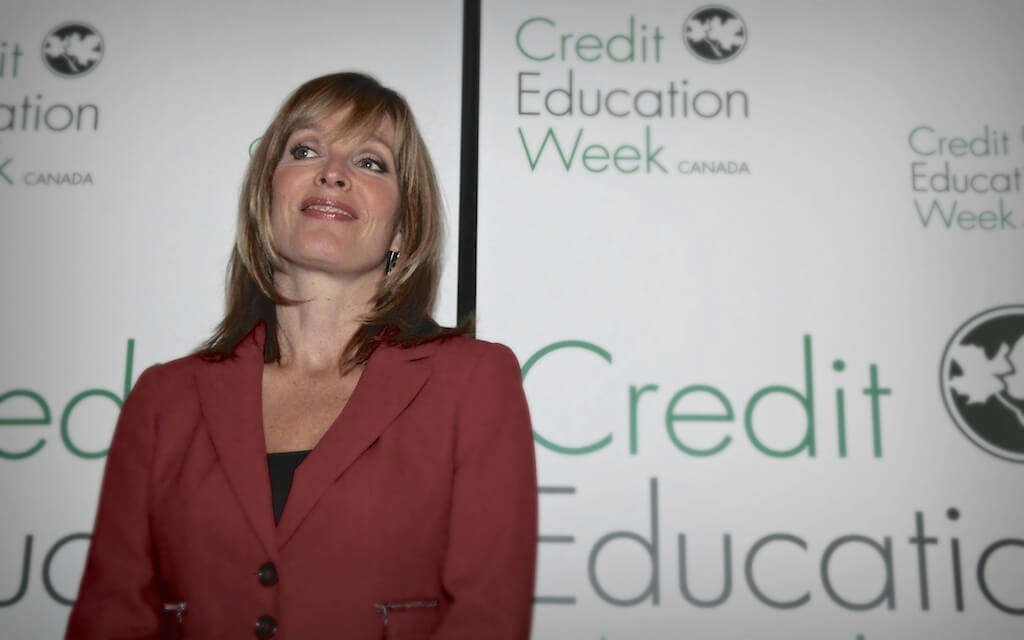
Financial coaching needn't be boring. It is hardly a dull or sleepy experience to see author and financial journalist Bruce Sellery bring loads of laughs to an auditorium, or hear media star Dianne Buckner of TV’s Dragons’ Den fame captivate a crowd with personal stories about money, or share insightful conversation with some of the smartest financial experts and bloggers in Canada. Fun, entertaining, and informative are the words that describe the activities in Toronto and across the country two weeks ago as Credit Education Week Canada (CEWC) enjoyed it’s eighth year of success.
From the Toronto hub of activities alone there was plenty going on, with presentations, workshops, and conversation framed around this year’s theme “Failure to Launch.” The theme was spurred from a popular movie with the same title from not so long ago - a romantic comedy showing the complications that necessarily arise when people, particularly young adults, fail to get motivated and get on with life. Well, for any young adults still occupying their parents’ basements, CEWC offered plenty of guidance in terms of pathways for success through improved financial literacy.
We launched the week with Professional Development Day at Toronto’s downtown YMCA. A roster of brainy authors and experts gave presentations, shared thoughts, and engaged in Q and As before a full capacity crowd. Renowned author, journalist, and consumer advocate Ellen Roseman served as master of ceremonies. Getting things started was the sprightly Bruce Sellery, who as I say was a joy to behold, comically presenting investment insights covered in his book The Moolala Guide to Rockin’ Your RRSP. Much more of interest was supplied by Canada’s first Financial Literacy Leader, Jane Rooney, as well as a panel of experts serving on this year’s newly formed Financial Literacy Steering Committee under Jane’s wing. Other special guests joined in, too.
As all this got going in Toronto, many other activities got underway in communities across Canada – all adding to the continuing growth of Financial Literacy Month now held each November and officially sanctioned by the Government of Canada. Topics under discussion brought thought-provoking – and even downright surprising – news into financial matters including, among other topics, goal setting, making the most of retirement pension plans, and tapping into student loans and scholarships (did you know that $16 million in student scholarships went unclaimed last year?). As well, much was said about the need for private-public sector cooperation to integrate financial literacy initiatives across the country, particularly in relation to educational programming for kids and youth approaching adulthood.
Later in the week – at a special luncheon in Toronto – CTV journalist Pat Foran and I got together with top bloggers to talk turkey about money, with live tweeting filling the air. As the week progressed, photos poured in from a CEWC photo contest challenging people to take “selfies” to show their money face – be it happy or sad – for dibs on cash prizes.
In Toronto, the week rounded out with the annual CEWC Dinner Gala, hosted by Pat Foran and featuring keynote speaker Dianne Buckner, a respected journalist and producer on top of her Dragons’ Den appearances. In addition to her engaging storytelling, she helped to present scholarships of $500 to $5,000 to 19 of the 30 winners of this year’s CEWC Student Essay Writing Contest. The grand prize went to Tiffany Lu whose essay appeared previously in this blog space. She and all the other students wrote about the dumbest thing they’ve ever did with their money and what they learned from the experience.
It’s fair to say that CEWC’s “Failure to Launch” theme reflected nothing but success this year. And it’s all thanks to talented guests and generous sponsors. On behalf of CEWC’s platinum sponsors – including my agency Credit Canada Debt Solutions and Capital One Canada – I extend sincere gratitude to other sponsors including RBC Royal Bank, Ontario Lottery and Gaming Corporation, yconic, TD Bank, Harris & Partners, The Oakman Group, Visa, MNP Ltd., BMO Financial Group, and Equifax.
Frequently Asked Questions
Have a question? We are here to help.
What is a Debt Consolidation Program?
A Debt Consolidation Program (DCP) is an arrangement made between your creditors and a non-profit credit counselling agency. Working with a reputable, non-profit credit counselling agency means a certified Credit Counsellor will negotiate with your creditors on your behalf to drop the interest on your unsecured debts, while also rounding up all your unsecured debts into a single, lower monthly payment. In Canada’s provinces, such as Ontario, these debt payment programs lead to faster debt relief!
Can I enter a Debt Consolidation Program with bad credit?
Yes, you can sign up for a DCP even if you have bad credit. Your credit score will not impact your ability to get debt help through a DCP. Bad credit can, however, impact your ability to get a debt consolidation loan.
Do I have to give up my credit cards in a Debt Consolidation Program?
Will Debt Consolidation hurt my credit score?
Most people entering a DCP already have a low credit score. While a DCP could lower your credit score at first, in the long run, if you keep up with the program and make your monthly payments on time as agreed, your credit score will eventually improve.
Can you get out of a Debt Consolidation Program?
Anyone who signs up for a DCP must sign an agreement; however, it's completely voluntary and any time a client wants to leave the Program they can. Once a client has left the Program, they will have to deal with their creditors and collectors directly, and if their Counsellor negotiated interest relief and lower monthly payments, in most cases, these would no longer be an option for the client.







